-
@dennypage can you please help? My UPS has Automatic Voltage Regulation. With the summer heat on the power grid I noticed the input voltage goes from 115-118 volts ac so it has been kicking in a lot more. I think I must have adjusted the original setting to auto correct for anything under 119 volts ac during set up on a older version of this package. However the package now I can not find where that setting to adjustment when AVR should run anymore. The battery this week is getting hammered with the local grid. Last month we had a brownout I had never seen one until this year in California. Our fans everything was slow motion. My HiFi system said low voltage on the screen even a couple weeks ago. I am running in older CP1200AVR made by Cyber Power. I can not remember if you could change the UPS settings from inside of my Netgate firewall or not. It restored 100 of the batter charge after the brownout. However is there anyway to adjust AVR settings from inside of NUT? Or am I imagining this?
-
@jonathanlee You can adjust UPS settings via NUT, but you don't do it from within the GUI. To change UPS settings, use the upsrw command. Documentation is here. If you run upsrw without any options other than the UPS name, it will give you a list of variables that can be set.
-
@dennypage thank you this is exactly what I was looking for, the AVR settings I have set killed the battery with all the issues. It needs to be set to the normal 90 range again.
-
@dennypage We got some fresh batteries from Batteries plus today :) It keeps saying access denied. Is there a way to add users on the pfsense? I tried it won't take the add user command also. upsd.users won't work. The clock also will not run. This is for a Cyberpower CP1200AVR running driver USB usbhid. I thought originally a version back I could change the settings in the GUI and that it also had a port number. This new version for 22.05 seems to be missing the other settings like the password and options.
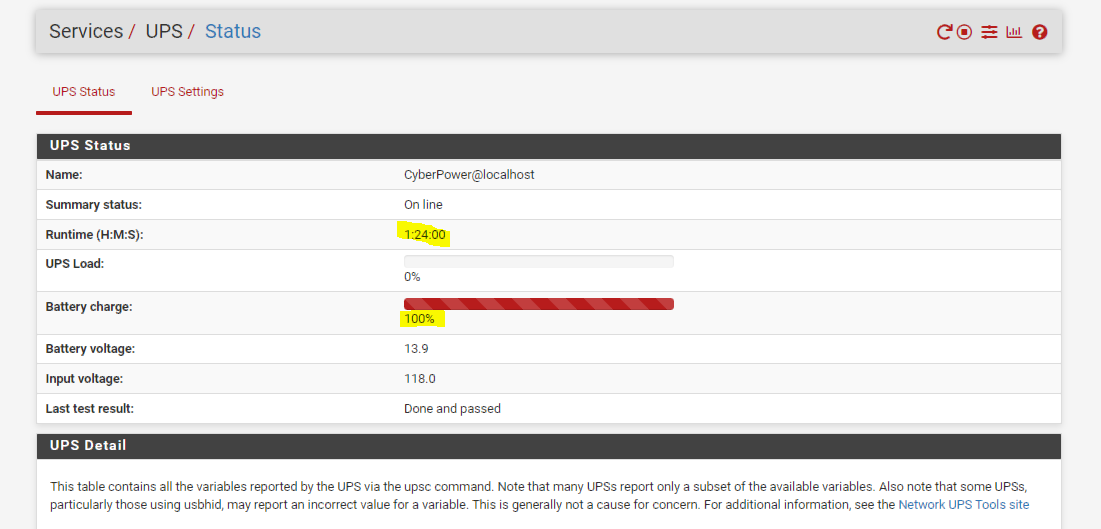
(GUI View)This thing saved me in a final once already. The power was out during a computer science final and this thing saved the day for the 5 mins it was out.
-
@jonathanlee said in NUT package:
We got some fresh batteries from Batteries plus today :) It keeps saying access denied. Is there a way to add users on the pfsense? I tried it won't take the add user command also. upsd.users won't work. The clock also will not run. ... I thought originally a version back I could change the settings in the GUI and that it also had a port number. This new version for 22.05 seems to be missing the other settings like the password and options.
I don't understand many things here. Can you clarify what "access denied" refers to? What does "clock also will not run" mean? What port number do you refer to?
Currently, no new version of the NUT package has been pushed for 22.05. There is a PR pending to update to 2.8.X, but the current version is still 2.7.4_10. Same as 22.01.
-
 G Gertjan referenced this topic on
G Gertjan referenced this topic on
-
 G Gertjan referenced this topic on
G Gertjan referenced this topic on
-
@dennypage thanks for all you do and the reply.
When I use the upsrw command with arguments to change items variables with = it displays access denied with my username and password I originally configured.I did configure a username and password for this package before however all those options are no longer listed inside of Pfsense.
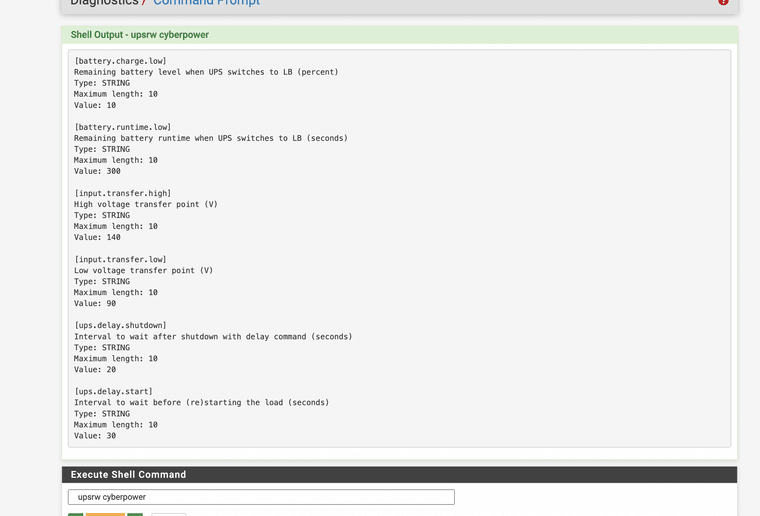
(Image: upsrw command I am talking about "ran without any arguments")
The clock I am referring to is the "runtime clock" for the UPS it stops and no longer continues inside the firewall.
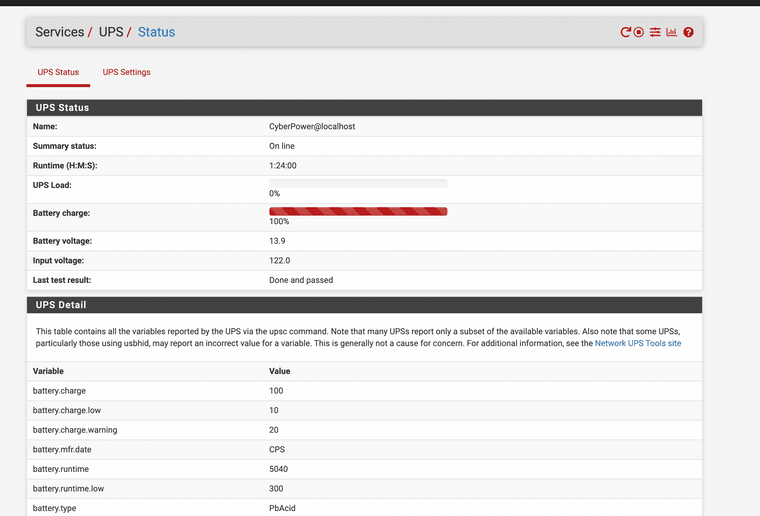
(Image: Runtime is not functional stays the same at 1:24:00 never changes)
The port number I am talking about would be how you access the firewall inside of a web browser url for example when I originally installed NUT it had me configure a username and password for the UPS and had a port for the Network use outside of the firewall. I think it's 3493 or something. So for example if I access the firewall with https://192.168.1.1:3493 I should be able to see the GUI for NUT.
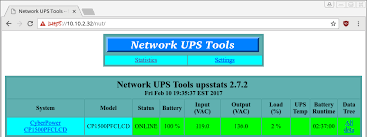
(Image: NUT being accessing with URL outside of firewall as seen with other users on the web I would like to be able to do this)
I am trying to access the URL for just the UPS similar to squids URL specific port.
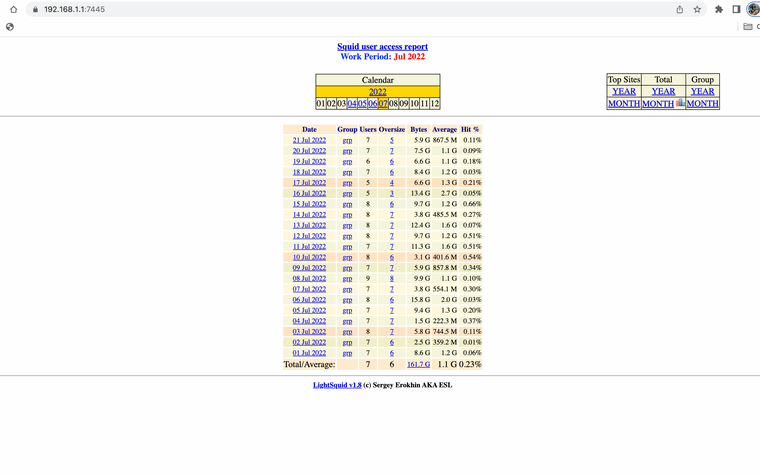
(Image: Squid's URL specific access uses port 7445)

(Image: USP load also stopped working it does work in 22.05 right after this package is freshly installed after it just displays zeros for me and does not change again)
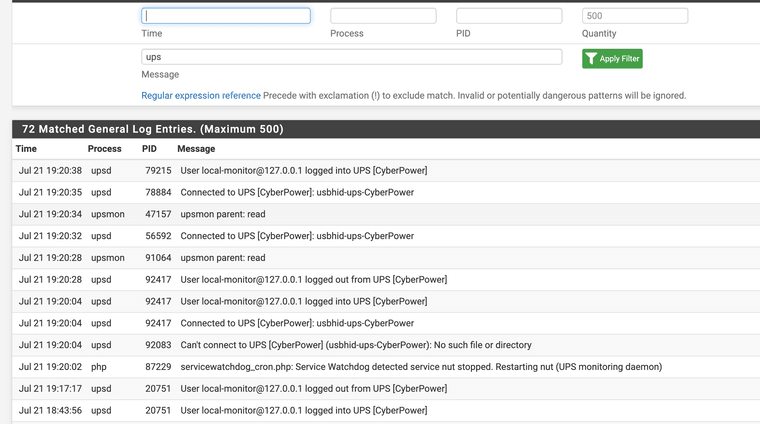
(Image: recent logs for UPS)
-
@jonathanlee said in NUT package:
@dennypage thanks for all you do and the reply.
When I use the upsrw command with arguments to change items variables with = it displays access denied with my username and password I originally configured.I did configure a username and password for this package before however all those options are no longer listed inside of Pfsense.
There is no specific input field for a username/password. Never has been. You may be thinking of the "Additional configuration lines for upsd.users" section in the Advanced settings. You could have added a user in there for supporting remote monitoring. But that user would not be able to perform administration tasks such as writing variables in the UPS.
The admin password for NUT is not configurable. It is randomly generated for security. You can find it by looking in /usr/local/etc/nut/upsd.users.
The clock I am referring to is the "runtime clock" for the UPS it stops and no longer continues inside the firewall.
...
(Image: Runtime is not functional stays the same at 1:24:00 never changes)Runtime is not the amount of time the UPS has been running. Runtime is the amount of time the UPS can power the load if mains are off. In other words, if power fails, your UPS is currently capable of sustaining the system for 1 hour and 24 minutes.
The port number I am talking about would be how you access the firewall inside of a web browser url for example when I originally installed NUT it had me configure a username and password for the UPS and had a port for the Network use outside of the firewall. I think it's 3493 or something. So for example if I access the firewall with https://192.168.1.1:3493 I should be able to see the GUI for NUT.
The NUT cgi GUI has never been part of the pfSense package. You must be thinking of a different system or package.
The two available NUT GUIs are the main status/detail page (Services->UPS->UPS Status), and the UPS Status widget available for install on the dashboard page (Status->Dashboard). Both of these are part of the main pfSense UI when the package is installed. There is no separate port.
-
So, I confess that, after I'd initially setup NUT, I'd been content with that fact that I could see UPS status and that it would probably function as intended in a power outage situation. We rarely lose power here and, when we do, it usually comes back in a few minutes, so I'd never hit an extended outage period before. However, I did hit that situation a few weeks ago and realized my pfsense (Netgate 3100) did not shutdown correctly.
I'd only just these past few days been able to truly play around with it to see what might be going on. I tried running upsmon -c fsd to simulate an outage and found the system shutdown the UPS in about 10 seconds, well before pfsense could actually shutdown. Here is what I see from the console when I run that command:
[22.05-RELEASE][root@pfSense.localdomain]/root: upsmon -c fsd Network UPS Tools upsmon 2.7.4 [22.05-RELEASE][root@pfSense.localdomain]/root: Netgate pfSense Plus is now shutting down ... Network UPS Tools upsmon 2.7.4 kill: No such process UPS: ups (master) (power value 1) Using power down flag file /etc/killpower Power down flag is set Network UPS Tools - UPS driver controller 2.7.4 Network UPS Tools - Generic HID driver 0.41 (2.7.4) USB communication driver 0.33 Using subdriver: CyberPower HID 0.4 Initiating UPS shutdown pflog0: promiscuous mode disabled ugen1.2: <CPS CP685AVRa> at usbus1 (disconnected)When it says "Netgate pfSense Plus is now shutting down", the UPS power turns off within 10 seconds and I see nothing in the logs about pfsense actually shutting down. It just goes from normal system messages to rebooting and I see it having to repair the file system (the repair messages don't seem to actually be in the system.log):
Jul 30 07:30:47 pfSense kernel: Root mount waiting for: CAM Jul 30 07:30:47 pfSense kernel: Root mount waiting for: CAM Jul 30 07:30:47 pfSense kernel: mountroot: waiting for device /dev/diskid/DISK-0E32776As2a... Jul 30 07:30:47 pfSense kernel: WARNING: / was not properly dismounted Jul 30 07:30:47 pfSense kernel: random: unblocking device.Thoughts as to why pfSense is not actually initiating a shutdown and the UPS kill command is being sent so soon?
Thanks,
Dan -
I would recommend for shutdown testing that you connect your NUT master (pfSense in this case) directly to power rather than through the UPS. This is to guarantee that you have complete logs and to avoid potential corruption to your your file system.
Now, re-run your test and time how long it takes for the shutdown to happen. Pay particular attention to the time between the OS shutdown completion and the actual power cut.
The UPS must be configured to have sufficient delay between the kill command and the actual load shut off. Often, the default value (usually in the 10-20 seconds) is insufficient for the operating system shutdown to complete and needs to be increased.
With higher end UPSs you can usually configure this value via upsrw. Look for a "ups.delay.shutdown" or "load.off.delay" parameter.
With other UPSs the off delay has to be set every time the ups starts up. Particularly if you're using USBHID-UPS, then it's it's almost certain that will need to set the value "offdelay" in the driver configuration.
-
@dennypage Thank you very much for the feedback. Based on what you described, I think I might have misunderstood when the UPS power off command is issued. Based on this documentation on the NUT site:
6. The upsmon primary: generates a NOTIFY_SHUTDOWN event waits FINALDELAY seconds — typically 5 creates the POWERDOWNFLAG file in its local filesystem — usually /etc/killpower calls the SHUTDOWNCMD 7. On most systems, init takes over, kills your processes, syncs and unmounts some filesystems, and remounts some read-only. 8. init then runs your shutdown script. This checks for the POWERDOWNFLAG, finds it, and tells the UPS driver(s) to power off the load by sending commands to the connected UPS device(s) they manage. 9. All the systems lose power. 10. Time passes. The power returns, and the UPS switches back on. 11. All systems reboot and go back to work.I had assumed that the power off command would not be issued until pfSense had performed most of its shutdown, but that wasn't the case at all.
I did in fact try this by pulling the plug as well with an artificially higher battery.charge.low setting and experienced the same rapid power off before pfSense even began shutting down.
If the power off command is being issued before pfSense even begins a shutdown sequence, I understand what you are saying about needing to increase the ups.delay.shutdown. I see that my UPS (CP685AVR) allows setting this via upsrw. I'll try playing around with that this evening after the household heads to bed. Don't think they'd appreciate losing Internet.
Thanks,
Dan -
@dennypage - just a quick follow-up. I tried to upsrw way of setting the ups.delay.shutdown, and, as you suggested, that didn't stick, so I set the offdelay and ondelay in the additional driver args section. I still won't be testing a full off scenario with the new settings until this evening so the family doesn't lose connectivity, though.
In the interim, would you be able to comment on my observations of the UPS power off command being sent immediately rather than after pfSense has had init shut everything down as per the NUT documentation I copied in the post above? Is that just due to the way NUT is being controlled under pfSense?
The way the NUT documentation describes is, the UPS driver shouldn't tell UPS to power off the load until after all the processes have shutdown and disks have been unmounted or remounted read-only.
Thanks,
Dan -
@dannyboy2k said in NUT package:
The way the NUT documentation describes is, the UPS driver shouldn't tell UPS to power off the load until after all the processes have shutdown and disks have been unmounted or remounted read-only.
The pfSense specific shutdown scripts are called early in the shutdown process. It's a two edged sword... on one hand you want things like rrd backup to happen early, on the other you want things like nut to happen late. Right now there is only one option, and it's early.
-
 D dennypage referenced this topic on
D dennypage referenced this topic on
-
@whoami-tm said in NUT package:
vendorid=09ae
productid=2012
offdelay=60how on earth did you get your SMART1500LCD to even show up and stay connected. Mine just disconnects (and immediately reconnects) every 10 seconds (approx.).
I'm using an old NetGate SG-4860:
Plug-in USBugen0.4: <Tripp Lite Tripp Lite UPS> at usbus0 uhid0 on uhub1 uhid0: <Tripp Lite Tripp Lite UPS, class 0/0, rev 1.10/0.09, addr 4> on usbus0Every 10 seconds (or so) it disconnects
ugen0.4: <Tripp Lite Tripp Lite UPS> at usbus0 (disconnected) uhid0: at uhub1, port 2, addr 4 (disconnected) uhid0: detachedusbconfig ugen0.1: <Intel EHCI root HUB> at usbus0, cfg=0 md=HOST spd=HIGH (480Mbps) pwr=SAVE (0mA) ugen0.2: <vendor 0x8087 product 0x07db> at usbus0, cfg=0 md=HOST spd=HIGH (480Mbps) pwr=SAVE (0mA) ugen0.3: <Generic Ultra Fast Media> at usbus0, cfg=0 md=HOST spd=HIGH (480Mbps) pwr=ON (96mA) ugen0.4: <Tripp Lite Tripp Lite UPS> at usbus0, cfg=0 md=HOST spd=LOW (1.5Mbps) pwr=ON (0mA)I even tried using the same extra arguments to
usbhiddriver that you showed in your settings but I don't think it matters since the USB device keeps disconnecting.
Perhaps I'm just unluckyBroadcast Message from root@pfSense.localdomain (no tty) at 14:31 EDT ... Communications with UPS tripplite lost Broadcast Message from root@pfSense.localdomain (no tty) at 14:31 EDT ... UPS tripplite is unavailable upscmd -l tripplite Error: Driver not connected -
@racecarr said in NUT package:
Plug-in USB
ugen0.4: <Tripp Lite Tripp Lite UPS> at usbus0
uhid0 on uhub1
uhid0: <Tripp Lite Tripp Lite UPS, class 0/0, rev 1.10/0.09, addr 4> on usbus0Every 10 seconds (or so) it disconnects
Start with basics. Disable NUT. Reboot pfSense.
Does the log still fill with disconnect/reconnect messages every 10 seconds?
If so, do you have a USB hub in-line with the UPS? If you do, try removing it.
-
@racecarr I would test the USB cable also. Just to be sure. I have a Cyber power system it works great. Saved my Java programming final one year. Power went out during the timed test, last 10 mins.
-
@racecarr not sure if you read all my posts but the conclusion was I returned the Tripplite Smart1500 back to amazon because I couldnt get it to work with NUT the way I needed and bought a APC BGM1500B and a rack shelf. The APC just worked and did everything with NUT I needed it to do. I am also running a Netgate SG-4860-1u
-
@whoami-tm yeah it does seem like a potential big waste of time. I got the Tripp-Lite for free so I figured I would try and make it work.
Ironically it seems to work great when plugged in to a Mac -
Hello,
I have at home a VDSL line as main and a LTE Netgear Modem as backup.
Both are configured in pfSense as Multi WAN Failover Gateway.
PfSense Plus 22.0. A n APC USP is connected directly via USB.
Nut is installed and working fine.
However when one of both connections drops e.g. due high ping latency I get an message by PfSense that the UPS has been disconnected from pfsense.
Why has the Gateway an impact to the nut service?
How can I avoid that nut throws an error when one of both gateways gets down? -
@renegade A gateway failover results in pfSense restarting all packages. The reason is that pfSense does not know which services are impacted by the gateway and which are not. If you had a single gateway you could just disable the gateway monitoring action, but with two gateways that you are switching between I don't believe there is anything you can do currently. Perhaps in the future.
-
@renegade said in NUT package:
I get an message by PfSense that the UPS has been disconnected from pfsense
Can you show the message ?
Copyright 2025 Rubicon Communications LLC (Netgate). All rights reserved.